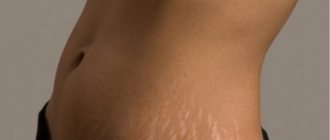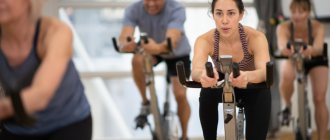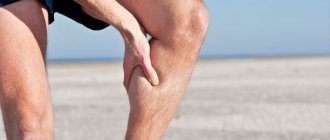The topic of losing weight, getting in better shape and making changes in life in general on the eve of the New Year holidays is very relevant. Therefore, I want to share my own experience and observations - for some it will be useful to “check” their feelings, for others my revelations will help them make a decision.
I've been doing fitness for almost a year. In the first 3 months I lost 10 kg and have maintained the weight since then. And yet I am a beginner, because less than a year is not experience. And not a deadline. This is the time when you finally learn to live differently. Do not adhere to the regime, but live. But, despite this, he still remained a beginner.
Even after losing kilos, approaching the coveted mark on the scales, or even surpassing your wildest expectations, you don’t look like you do in an advertising picture of a fitness club, and this will still take a lot of time. But now, when you have achieved what seems to be your cherished goal, you understand: you still have to work and work to achieve perfection, but at the same time it is quite achievable.
Motivation: “You can’t live like this”
Why did I start doing fitness? Yes, at some point I just realized that “this can’t continue.” In addition, I came across a group of Dnepropetrovsk trainers on the Internet with “before and after” photos, and along with the perceived need came a firm confidence: they could do it - and I can do it, without options.
In fact, you can motivate yourself by imagining how you will walk on the beach without being embarrassed, buy size S and, perhaps, fit into “those jeans” (if they are still preserved somewhere on the mezzanine). But all these motivations are absolutely meaningless if there is no clearly realized impossibility of living without changing. For some, this moment will never come - the person will look for excuses and eat away sadness with donuts. And someone will suddenly realize that they cannot sleep, knowing that they have done nothing to change, and will begin to do something every day, confidently moving towards the result.
It turns out that for real change a person must internally “mature”. You can truly change something in your life and in yourself only when you understand that “you can’t live like this any longer.”
During the first training
“My heart is beating fast and it’s become difficult to breathe!”
This is a healthy reaction of the body to physical activity. There is no need to be afraid of it, because it is a completely natural process. You begin to breathe deeper and more often, saturating your cells with oxygen. As a result, the complexion begins to change for the better.
You also don’t have to worry about your heart rate, because it can be affected not only by loads, but also by heat, air humidity, lack of oxygen in the air, overeating before training, menstrual periods, stress and even loud music!
Changes also occur in the muscles. They begin to become more actively saturated with blood and even swell (after training, this effect goes away)! In addition, long-forgotten and little-used muscles, which remind of themselves with a slight aching pain, also become toned.
And you become not only stronger, but also more resilient, stronger, more energetic and more cheerful. During physical activity, a “hormonal storm” begins in the body, which triggers and accelerates slow metabolic processes. The body is literally renewed.
There is also a release of adrenaline and other hormones, the nervous system is excited, which leads to a sharp improvement in well-being and increased energy! Paradox!
Conclusion: even during the first lesson, qualitative changes begin to occur in the body of every person!
First workouts in the gym
It was difficult at first.
Not so much physically, but to find time to “place” the child. When the problem was resolved over time, instead of “I want / don’t want” to go to training, “I have to” appeared, so unambiguous that when “I can’t” appeared due to force majeure (illness, for example), I had to persuade myself to come to terms with it . Most beginners have a hard time physically, especially if the person has not worked out anywhere and is not used to physical activity. I got hooked within a month. I’m used to getting my “portion” of physical activity. Many people note that after some time they “get hooked” on training, and if they are forced to miss it, the body itself reminds that it was not given enough.
However, this does not mean getting used to the physical activity itself. If there is not the slightest fatigue (even if pleasant) and everything is easy, then you are doing something wrong. Or do you constantly do the same thing - then this is a question for the coach. The loads must be varied, otherwise there will be no progress, and at the same time correct - so that you do not harm yourself.
2 days after the start of training
“My whole body aches and hurts!”
The feeling of soreness is not only an inevitable stage after the first training, but even more so – necessary! After all, this means that your muscles grow and become beautiful and pumped up! Therefore, for many athletes such pain is even very pleasant =)
You shouldn’t be afraid of this process, because it won’t always be like this. Your body is just adapting to the stress and the soreness will go away over time.
By the way, to reduce body aches, you can take a hot bath or go for a massage. Stretching will also help.
Conclusion: it hurts - it means it’s growing! Therefore, “get high” from this pain, like athletes, imagine how your body becomes toned and beautiful.
Diet for weight loss
Nutrition correction, it turns out, scares people much more than the need to exercise. It’s clear, because the pleasure derived from food is perhaps the most easily accessible. And we are used to getting it whenever we want. That's why many people train without changing their eating habits, and then complain that they don't see results.
Changes in diet did not scare me, because since I spend effort and time on something (and free time is more important than cakes), I will do everything so as not to regret it.
Oddly enough, once you got involved, it became completely easy. Maybe it’s a matter of character - I was given a clear algorithm, which was even interesting to follow. Moreover, it provides the opportunity to treat yourself to sweets and other delicacies without being tormented by remorse (which most often you also want to “eat”).
You just need to understand that you shouldn’t eat cakes at night, but if you really want to, eat them in the morning. And not a whole cake every day, but a piece in honor of the holiday. And it’s better not a cake, but a chocolate bar, for example, or another more natural treat. This is also because soon even the best cakes begin to taste too sweet or too greasy. Instead of enjoying it, you cringe because you taste sugar or butter.
You stop putting sugar in your coffee, and after a month or two you’re already spitting if you forgot to take a cup of sugar.
If you stop frying food at home, you will no longer be in danger of overeating fatty and fried foods when away. Simply because it suddenly becomes tasteless.
And this in no way means that you need to deny yourself always and everything. Although some people manage to forget about all the “unnecessary” products at once, the majority are afraid of this total ban. But if you tell them when and in what quantity they can treat themselves to their favorite “harmfulness,” they can avoid the psychological discomfort of the restriction.
I noticed this nuance - having a limit on the consumption of “harmful things”, you become more picky, often even delaying the moment, because, for example, you did not find exactly the chocolate bar for which you would like to exhaust the limit. This sounds, I suspect, strange, but in fact it works as an unconscious limiter. And - hurray! - a person does not feel deprived and unhappy (as if everything was forbidden to him), but at the same time he limits himself much more effectively. Golden balance: the sweet tooth receives candy without remorse.
Do I need a coach?
Undoubtedly. You don't know how muscles work. You can squat perfectly in front of a mirror, but do it incorrectly and you won’t achieve results. Apart from the coach, no one will point out your mistakes. Why do people come to the gym and leave after a month? Because they do the exercises incorrectly, waste time, but do not see results.
Not everyone has money for a trainer, but if you come to the gym, take a couple of lessons so that they at least explain the technique of performing basic exercises and write an individual program. If you have forgotten how to do an exercise, go to any trainer, don’t be shy.
From the outside
At first, others look at a thermos and a bottle of water in a handbag, some skeptically, some sympathetically. They are surprised at the selectivity at the holiday table and persuade: “You’re already skinny, eat it!” - to which I have to answer that the reason I’m skinny is because I know when to eat and when not to.
Over time, people get used to it. Mainly because he sees the results - no joke, in 3 months I lost weight from size L to size S, which is hard not to notice.
Older relatives react most unexpectedly (for me, at least). First, they warn you not to go hungry, so that you don’t get “ditched” during training, otherwise you’re up to something – she’s skating here in the evenings, jumping somewhere... And then: “You’re so thin, it’s almost indecent, you should at least gain weight.” a couple of kilos."
There is another reaction - friends come up and ask what and how. Some people are surprised that there were no miracle pills. Someone will certainly notice: “Where are the breasts?” or “Don’t get an ulcer.” Or that he looks haggard (this remark, by the way, may well have a real basis - the face has also lost weight and requires care and attention).
And someone, having received information, simply silently gets down to business.
About miscellaneous
Breasts - yes, most likely they will shrink. I have one size. But I was never the owner of enviable figures, so I was not saddened by the “loss”.
By the way, there’s a girl training with me - slender, like a twig, with a good third or even fourth size. I don’t know if she was losing weight, or if she just came like that, but it’s a fact that there are skinny women with large breasts.
Ulcer - everyone knows that it occurs: a) from starvation; b) from nerves; c) those who do not eat soup (for the last point, an emoticon like “sarcasm” would be useful). When my father began to suspect that I was starving, I had to take pictures of my portions during the day and show him. I’m not a fan of clicking food on my phone, but what can’t you do for the peace of mind of your loved ones and your own as well. But I am no longer suspected of starvation.
The wardrobe will have to be changed in many ways.
Elegant dresses that favorably emphasized the advantages of the figure, hiding flaws, now hang openly, seductive tight blouses have become awkward robes, but sweatshirts and stretch turtlenecks remain. And I’m also very glad that I have a winter coat and a down jacket under my belt - at least I didn’t have to struggle with them. And so - yes, I changed my jeans 3 times during this time. I bought some more necessary things, but not much. The trick is that when you are happy with your figure, you need significantly less things. Because you are less likely to be dissatisfied with your reflection in the mirror, and it no longer seems that the blouse you bought yesterday makes you look fat.
About nutrition
The main concern with training without weights is that you won't be able to build muscle this way. Yes, of course, you won’t be able to work with hypertrophy like in the gym, but at least it’s definitely possible to preserve muscles. The key factor here is nutrition. If you build a competent diet in conditions of decreased activity, then excess fat will definitely not stick.
Most people isolated themselves in apartments, but I was lucky - I live outside the city. And if before quarantine I moved mainly by car and did not walk more than 6,000 steps a day, then in isolation I began to walk at the time when I usually went to work, and now I walk 12-18 thousand steps a day.
Changes in physical activity should be compensated by nutrition: if a person only walks around the apartment, then it is better to go into a calorie deficit. And if he can walk outside, then it’s not scary to stay on support calories (when incoming energy is equal to outgoing energy).
I decided to stop gaining weight (calorie surplus), because without the gym it was scary to gain excess fat instead of muscles. But everything was fine with my weight and appearance, so after a month I decided to add a little calories while simultaneously increasing my activity. According to the plan, I should not gain weight, but simply spend more energy and, accordingly, consume more. So far it's working.
Experts Say Can You Build Muscle on a Calorie Deficit? that muscles grow even with a calorie deficit, just very little by little. And you can achieve a sculpted body precisely due to a deficiency: muscles consist of protein and water, so if you get rid of excess water (for example, eat less carbohydrates and salt, and also be less stressed and get better sleep), then the muscles will be better visible.
To keep fewer calories from slipping in, you can fill the refrigerator with fresh vegetables and low-fat cottage cheese. Try to cram a chocolate bar into yourself after a bowl of cabbage and carrot salad - it will be difficult.
Maintaining weight loss results
Perhaps maintaining a new weight is more difficult than achieving it. Many people talk about this. The reason is banal - laziness, loss of interest. But, frankly speaking, it is not clear to me how a person can cross out his own efforts, “deprivations” (after all, he refused something in favor of training and proper nutrition) and, seeing the difference between himself “before” and “after,” allow himself go back to this “before”. Force majeure cases do not count - anyone can get sick or find themselves in a difficult situation, but most often it is the loss of interest that prevails.
I encountered this problem, although in a slightly different form.
There is a certain excitement in seeing how the number on the scale decreases almost every day. Now you’ve approached the weight that you considered the minimum achievable for yourself, now you’ve stepped over the mark, and you’re curious - how much more will you get? A little more, a little more... Now “those same jeans” are falling off, but... hmm, what if a little more? Curious if it will work or not?
And here there are three options for the development of events.
- Psychological dependence on this excitement, continuation by any means to reduce the number on the scales. Not for looks, just for numbers. It's dynamic, it's stimulating. And here is a direct road to mental disorder and anorexia.
- The optimal number according to your own common sense is reached (and approved by the trainer and nutritionist), and then you get bored. There is no excitement, the number fluctuates within a certain range. Lost momentum, lost interest. I suspect that it is at this moment that some people turn to conventional cakes as an alternative source of pleasure and abandon training.
- A person looks in the mirror and realizes that he has lost weight, but he is still far from real beauty (yes, yes, the demands have increased, especially when you look at the young girls around you, who at the same weight look, to put it mildly, differently) . And then a new goal appears - not numbers, but forms. That is, the goal changes, but the interest remains.
Speed of achieving results from strength training
People come to the gym not only to lose weight, but also to pump up muscle mass and acquire rounded shapes.
As a rule, such girls belong to a pronounced ectomorphic body type. Their characteristic feature is low body weight, with a minimal amount of muscle and fat. By nature, your metabolism is fast and instantly burns the calories you eat.
Therefore, gaining muscle weight for ectomorph girls is a difficult task. Moreover, it takes a long time.
On average, it takes girls from 3 to 6 months of regular training to gain 3-5 kg of muscle mass.
Before and after losing weight
The strangest thing is that I didn’t notice any difference in appearance - except that my clothes became looser, I had to buy new jeans, and then another one. But recently, looking through old photos, I was horrified - was I really like this once? And you considered yourself slim? I still can’t wrap my head around it...
I will hardly ever be able to show my most honest photos “before” and “after” of losing weight - at home, against the wall, in a swimsuit - to anyone other than two or three friends if they need additional incentive. But not to the general public. Precisely because they are honest. They clearly show not only what a tumbler I was less than a year ago, but also all the shortcomings that I continue to work on now.
Has your confidence increased? Certainly. Although globally this does not save us from the whole “bouquet of complexes”. Simply one of the reasons for uncertainty is crossed out.
Are there any difficulties? Of course have. For example, when it gets colder, you crave more carbohydrate foods, and even just sweets. I began to feel more cold. Now I understand why animals fatten up for the winter... I have to put on an extra layer of clothing. And in general, with the cold weather, there is an increasing urge to sit out in the warmth rather than go somewhere...
Actually, the difficulties are primarily associated not with festive tables, giving up alcohol and “evening cakes”, and not with nutrition in general, but with the need to attend training several times a week, if possible without skipping. And here it’s worth using the advice that almost all coaches give: once and for all, come to terms with the fact that such and such time (or a certain number of hours per week) is occupied for you. Default.
4 weeks after starting training
“It’s good that I didn’t give up (didn’t give up) training!”
The first month of training ended with pride in myself and a feeling of first results. If you didn't miss a single class and dutifully went to the gym three times a week, you've completed a whopping 12 workouts!
Now it has become easier for you to run, and the shortness of breath when you climb the stairs has disappeared. In addition, you have developed the habit of drinking a lot of water.
Conclusion: here they are - the first tangible qualitative changes in your body! Life becomes easier!











